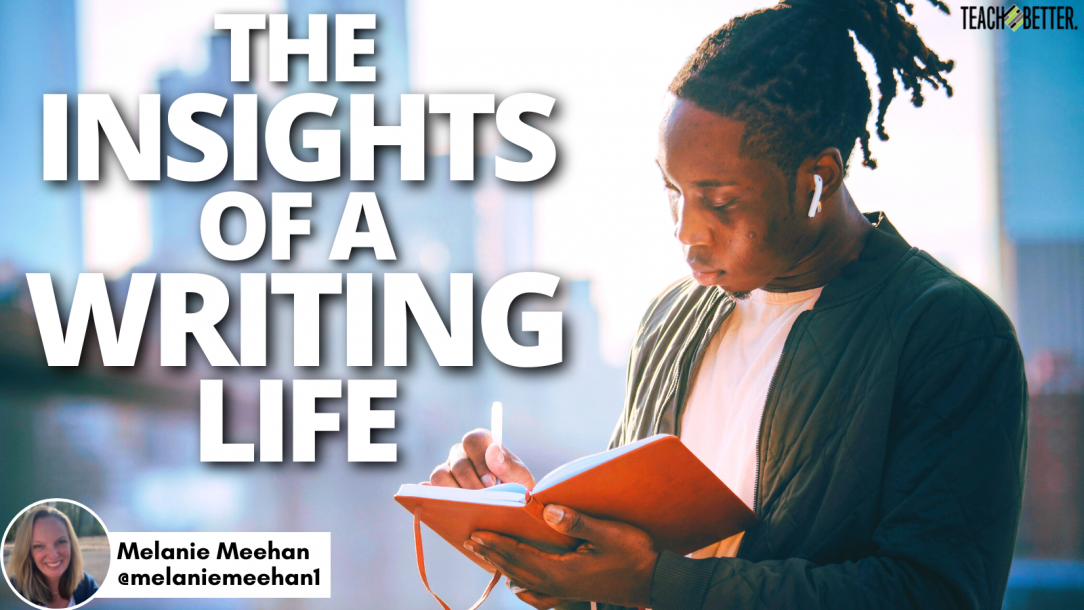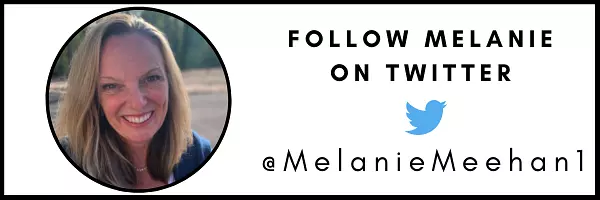TL;DR:
- Many of us write for different reasons. Therefore, you are a writer!
- Think about your writing life by starting with a writing timeline. What was your experience as a writer throughout your life?
- There are steps to the writing process: generating, planning, drafting, revising, and editing. Each person may spend different amounts of time at different stages.
- Writers have their own preferences in where and when they write.
Melanie joined Rae on the Daily Drop In to talk about writing.
“Spy on yourself,” I tell many teachers when they try out writing the sorts of pieces they ask students to write. “Think about the brain work you have to do as you write yourself. You’ll have way more insight as to where students get stuck and how you can help them.”
I loved my conversation with Rae. A highlight was the conversation about teachers and their writing lives. Many teachers—many people, for that matter—tell me they’re not writers. However, they write lists, letters, emails, report card comments, responses to students, and much more, I’m sure. You don’t have to publish your work to be a writer!
The Insights of a Writing Life: Writing Timeline
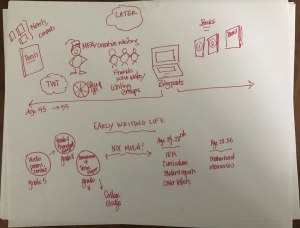
My own quick sketch of some highlights in my writing life
You might consider your writing life by starting with a writing timeline. There are probably times in your life when you did have to write things, whether they were essays in high school, research papers, lab reports, or reading responses. Are there any pieces you remember? Any that you loved? I remember my essay on The Thornbirds that I wrote in eighth grade while I was babysitting at the neighbor’s house. I wrote it as I watched Friday night television in the days of Love Boat and Fantasy Island. (I’m intentionally dating myself.) I was proud of my essay and distraught when my dad marked it up the next morning. I was even more distraught when he marked up the final handwritten copy on Monday morning which was the day it was due. This experience could be why I hardly ever write on students’ writing.
Morgan Davis, a Colorado educator, recently shared her writing timeline. She created it after reading a different post I wrote about them. Her realization was how much performance fuels her writing life. Speeches, performances, and teaching count toward your writing life!
Many teachers tell me they're not writers. However, they write lists, letters, emails, report card comments, responses to students, and much more, I'm sure. You don't have to publish your work to be a writer! Click To TweetWriting Process
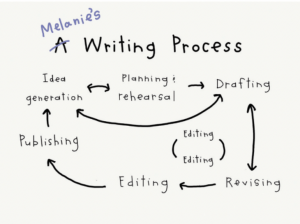
My writing process reflects the amount of time I spend in the drafting phase.
I might be dating myself again when I share that when I first introduced writing workshop to a group of students, I set up a classroom chart with what I deemed the steps of the writing process: generating, planning, drafting, revising, and editing. The daily status of the class involved everyone setting their clothespins on the chart to indicate what step they were on for the day. I remember one student who constantly got up to move his clothespin. He lived in a constant state of movement between planning, drafting, and revising. At the time, I’m sure I thought he was avoiding the task, and he might have been. But he also might have been the most insightful writer in the room about the nuances of the writing process, and I would now say that there isn’t a single process for writing, not even for the same writer.
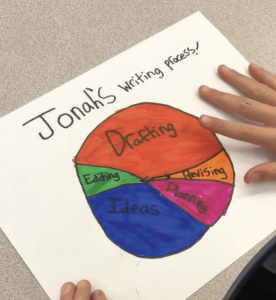
A student’s depiction of his writing process indicates the amount of time he spends thinking of ideas.
Now that I ask students about their processes, I have many of them explain how they like to plan quickly and then get to drafting, even if it means going back for significant revision. For the most part, that’s my process. Other students realize they are more comfortable with a detailed plan. They might spend a lot of time in the planning phase, but once they are on to drafting, they don’t feel the need for much revision. My teachers in my MFA for Creative Writing program introduced me to the terms pantsers and planners. These terms describe two types of writers. Both types have the potential to produce high quality writing, and neither is guaranteed to be more efficient or more correct.
To complicate this idea even more, one writer’s process may be different for different pieces.
I wrote my entire first book based on a plan, and then I didn’t like it. Therefore, I revised and rewrote the whole thing, spending an exorbitant amount of time in the revising phase of my process. Co-writing my second book involved more planning because my writing partner wanted a detailed plan before moving into drafting. While the time in the planning step was not my natural tendency, I appreciated the benefits of staying with a plan before jumping into drafting. And my third book, as part of a series, required an extensive plan before any drafting happened.
[scroll down to keep reading]The Insights of a Writing Life: Writer Preferences
As you study yourself as a writer, you might realize you have preferred spaces and places. Are you someone who needs certain conditions to write? A cup of coffee? Quiet? I tend to do my best writing first thing in the morning, sometimes while I’m still in bed.
My family has learned to leave me alone when I’m writing. They finally understood the importance of leaving me alone when I compared it to SCUBA diving. In order to go underwater, everything has to be balanced and all pressures have to be equalized. When you come to the surface of the water, you have to reset it all before going back under. That’s how I am with writing. I end up in my own world with my thoughts and characters. A conversation in the real world pulls me away from by stream of consciousness or imagination, and it may be that I can’t go back there for the rest of the day. I’m always in awe at how quickly students can move back and forth between the world of their writing and the reality of the classroom with interruptions, time constraints, and constant banter.
If you don’t already, begin to notice your own writing life. I bet you write more than you think you do! Think about your timeline, your sources of inspiration, your sticking points, the pieces you can’t wait to share with someone, and the pieces that will remain for your eyes only. Your insights might surprise you and provide powerful insights for your instruction of writing.
About Melanie Meehan
Melanie Meehan has been the Elementary Writing and Social Studies Coordinator in Simsbury, Connecticut since 2012. Melanie wrote Every Child Can Write, published by Corwin Press in October 2019, and, The Responsive Writing Teacher, co-written with Kelsey Sorum, published in March 2021. Her most recent book. Teaching Elementary Writing is part of the Five to Thrive series from Corwin Press. She is a co-author of Two Writing Teachers, and you can connect with Melanie on Twitter @melaniemeehan1.

